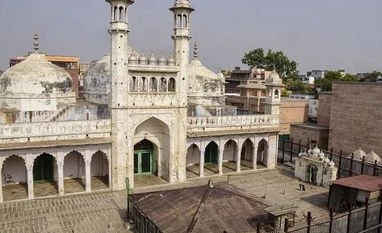A team of the Archaeological Survey of India (ASI) on Friday morning has resumed its survey of the Gyanvapi Mosque in Varanasi to determine if it was built over a Hindu temple after the Allahabad High Court gave its nod for a 'scientific survey' of the mosque, news agency PTI reported ,
"In the opinion of the Court, the scientific survey/investigation proposed is necessary in the interest of justice and shall benefit the plaintiffs and defendants alike and come in aid of the trial court to arrive at a just decision," the bench said in its order.
The Anjuman Intezamia Masjid committee has challenged the ruling in the Supreme Court, a request that will be heard later today.
News agency PTI quoted ASI sources as saying that the survey started at around 7:00 am. The ASI team members, along with the representatives of the Hindu petitioners, were present inside the complex under watertight security arrangements.
The members of the mosque committee have boycotted the survey. The committee representatives who were to accompany the ASI team for the survey stayed away.
What is the controversy about?
More From This Section
In August 2021, a petition was filed by five Hindu devotees, seeking the right to pray daily before Hindu idols on the outer walls of Gyanvapi Mosque.
During the hearing of the petition on April 8, the civil court had ordered a videography survey. On April 21, the mosque committee challenged the survey order in Allahabad High Court but their plea was dismissed. During the survey, a "Shivling" was found close to the ablution pond in the mosque. According to the Muslim defendants in the case, the object that had been found was a fountain.
In May, the Varanasi Civil Court ordered the sealing of the area in Gyanvapi Mosque where the "Shivling" was identified. The court also restricted namaz inside the mosque. The mosque committee moved the top court, arguing that the proceedings were an attempt to change the religious character of the mosque.The Supreme Court had, then, ordered that the "Shivling" be protected and Muslims be allowed to offer namaz inside the mosque.
The top court also transferred the case from Varanasi Civil Court to a District Court, arguing that such a sensitive case was better suited for a more senior judge. On July 21 this year, a Varanasi district court asked for a survey of the mosque premises by the ASI. The court asked the ASI Director to “find out…whether the [present structure] has been constructed over a pre-existing structure of a Hindu temple.” The district court stated that the survey would exclude the wuzu khana, or ablution area, which was sealed last year on the orders of the Supreme Court. The district court directed that the survey proceedings be videographed and the report be submitted before August 4, 2023.
The main issue to be addressed is whether The Places of Worship Act, of 1991, stops the litigants on the Hindu side from approaching the court for their right to worship Hindu idols situated within the mosque complex. According to Section 4 of the Act, “the religious character of a place of worship existing on the 15th day of August, 1947, shall continue to be the same as it existed on that day”
History of the Gyanvapi mosque
According to the available historical record, the Gyanvapi mosque was constructed in the 17th century on the orders of the Mughal emperor Aurangzeb after destroying the original Kashi Vishwanath Temple. Later on in the late 18th century, the present temple was built next to the mosque by the orders of Queen Ahilya Bai Holkar.
The current petition is not the first one to be filed regarding the Gyanvapi Mosque. In 1991, a lawsuit was filed by Hindu priests to access the mosque and pray.
The petition argued that the mosque was constructed atop the original Kashi Vishwanath temple and sought its transfer to Hindus. The lawsuit was dismissed in 1998.
)